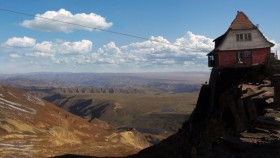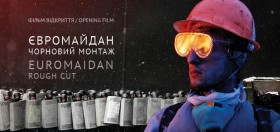A short trip to Thessaloniki it was, but I managed to attend a Docs in Progress session at the Olympion Cinema as well as the first 7-8 projects which were pitched at the Docs in Thessaloniki Forum, arranged by the festival and EDN (European Documentary Network).
In both cases the filmmakers made a short introduction and showed material. For the Docs in Progress the time slot for visuals was 10 minutes, at the pitching session the classical 7 minute concept was practised, including the verbal and the visual pitch. At both arrangements the filmmakers were to have individual meetings with broadcasters, distributors and sales agents.
I was impressed (and charmed) by one of the clips presented by director and producer Marco Gastine, who through his Minimal Films a couple of years ago made a series of films for the Greek Public Television (formerly ERT) on life in Greece. He is now in the process of finishing a new series, also called Docville, 13 episodes of 45 minutes, described by him as ”a cinéma-vérité documentary series” on Greece in times of crisis. I am looking forward to see ”Nikos and Miltos” by Katerina Patroni being completed – about twins who live at home with their mother, who takes care of her unemployed sons, who perform with a lot of humour and do express that the mother must take care of them in these moments of crisis! It seems she does not have a choice. The
other clip presented by Gastine was from the film coming up by Elias Demetriou, ”Stephanos” is the title, a homeless, jobless man in his forties, more predictable but a strong episode of course in a series about Life in haunted Greece.
In Bulgaria some people in personal crisis have come to a ”Revelation Point”, the title of a new film from the company Agitprop, whose Martichka Bozhilova presented the project with a clip that showed the great visual competence of the cinematographers Boris Missirkov and Georgi Bogdanov, who stood behind Agitprop films like ”Mosquito Problems and Other Problems” and ”The Boy Who was a King”, both directed by Andrey Paounov. From the description: The common element is that all of them (the people in the film) have decided to make a change (in their lives), and have joined a therapy group that sets laughter and positive thinking as a way to both mental and physical healing.
Also Zeljko Mirkovic from Serbian company Optimistic Film, not only a name but also a point of view on Life, came up with a project, in the pitching session, that is promising and has the name ”The Promise”. Together with Dusan Gajic, the director/producer wants to follow a French family that has settled in Serbia to cultivate wine, with some local opposition both here and there = in Serbia and in France. They talk about the Vranac grape (actually it is Montenegrin) and the one who writes these lines guarantee that this is quality and there is no reason for the French to hesitate… A very nice teaser and there must be possible funding for this project, here and there! The same goes for ”Samuel en las Nubes” (photo) by Pieter van Eecke, a Belgian project pitched with a high quality teaser, and a story that goes like this (taken from the website of the company): The Earth is warming up, yet we carry on with open eyes. Careless. The glacier on Mount Chacaltaya in the Andes has melted away completely in recent years. Samuel Mendoza is still waiting, among the Bolivian peaks, hoping for snow to fall upon the highest ski slope in the world. Against all odds, he and his friends are still trying to ski. A hundred feet below, in the highest climate laboratory in the world, scientists monitor the systems of measurement while the clouds float by, aloof.




